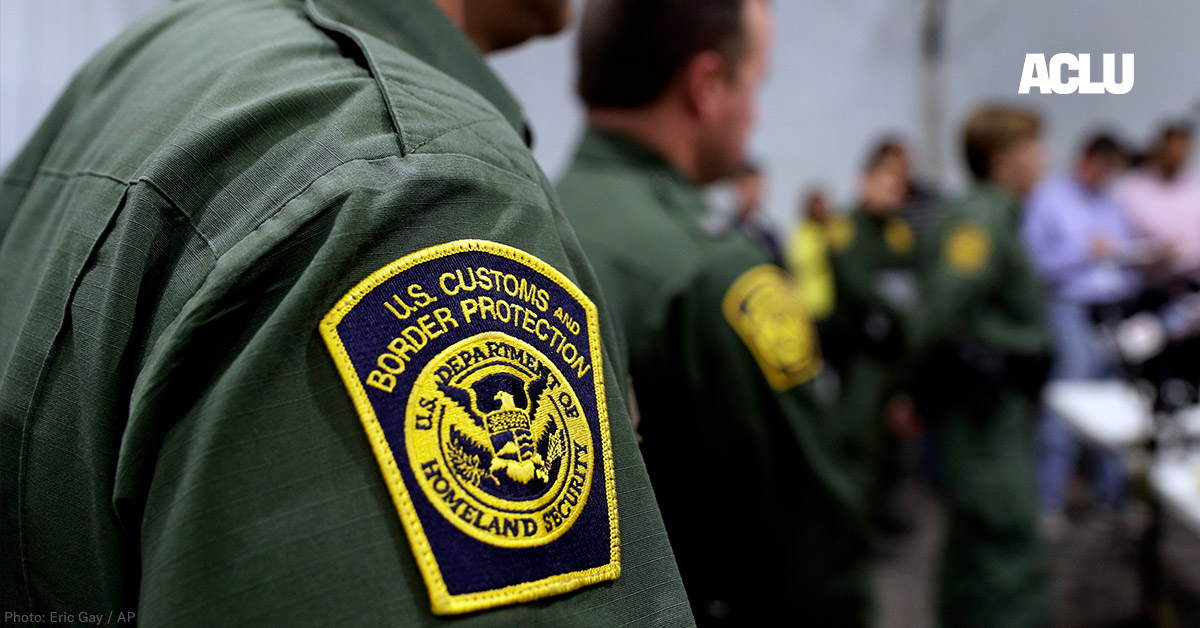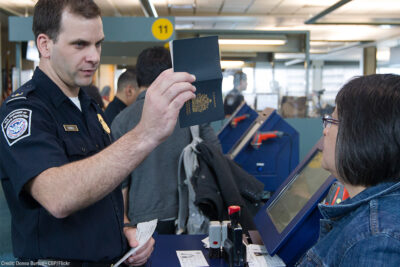
CLEAR, ACLU v. CBP—FOIA Lawsuit Seeking Records on CBP’s Tactical Terrorism Response Teams
What's at Stake
The ACLU and its partners have sued CBP to compel it to turn over records on highly secretive units deployed at U.S. ports of entry, which target, detain, search, and interrogate innocent travelers. These units, which may target travelers on the basis of officer “instincts,” raise the risk that CBP is engaging in unlawful profiling or interfering with the First Amendment-protected activity of travelers.
Summary
We filed our Freedom of Information Act (“FOIA”) lawsuit in the U.S. District Court for the Eastern District of New York in December 2019 with the Creating Law Enforcement Accountability and Responsibility (“CLEAR”) Project at the City University of New York School of Law, and NYCLU. Our lawsuit demands information about these CBP units, called “Tactical Terrorism Response Teams” (“TTRTs”), including how these teams operate, how their officers are trained, and whether the guidelines that govern their activities have civil liberties and privacy safeguards. We also want to know how many individuals have been subjected to detention, questioning, or denial of entry into the U.S. by these teams, and the basis for these decisions.
While there is little information publicly available about TTRTs, statements by CBP officials indicate that these units have been operating at U.S. ports of entry since at least 2017 and that they explicitly target travelers, including U.S. citizens, who are not on any government watchlist and do not present a security risk. CBP officials have also indicated TTRT officers may rely on their “instincts” or hunches to target travelers.
CBP targeting of people based on officers’ “instincts” permits officers to draw upon explicit or implicit biases and increases the likelihood that CBP is unlawfully profiling travelers on the basis of race, religion, ethnicity, or national origin. It also increases the likelihood that CBP is detaining, searching, or interrogating travelers because of their speech or associations, which may be protected by the First Amendment. These secretive teams’ activities may result in further government scrutiny and other negative consequences for targeted travelers, including placement on a government watchlist.
The public has a right to know how these secretive units operate and what their consequences are for innocent travelers’ rights.
Legal Documents
-
08/28/2023
Stipulation and Order of Dismissal -
08/25/2023
Proposed Stipulation and Order of Dismissal -
07/12/2023
Joint Status Report -
06/12/2023
Joint Status Report -
05/12/2023
Joint Status Report -
02/17/2023
Letter to Honorable Ramon E. Reyes, Jr. -
02/07/2023
Letter Motion to Adjourn Conference -
02/03/2023
Consent Motion to Reschedule Status Conference -
01/17/2023
Declaration of Gregory M. Koch -
01/17/2023
Supplemental Declaration of Patrick Howard -
01/17/2023
Letter to Honorable Ramon E. Reyes, Jr. -
12/02/2022
Motion for Extension of Time to File -
11/08/2022
Motion to Adjourn Conference -
11/02/2022
Memo & Order on Cross-Motions for Summary Judgment -
03/29/2022
Transcript of Oral Argument Held April 26, 2021 -
05/07/2021
Def's Letter to Judge Reyes re Documents for In Camera Review -
04/30/2021
Pls' Letter to Judge Reyes re Sample Documents for Court Review -
04/29/2021
Def's Letter to Judge Reyes re Documents for In Camera Review -
02/21/2021
Memorandum of Law in Support of Def's Motion for Summary Judgement and in Opposition to Pls' Cross-Motion for Summary Judgement -
02/19/2021
Pls' Reply in Support of Their Motion for Summary Judgment -
01/21/2021
Def's Reply and Opposition to Pls' Cross-Motion for Summary Judgment -
12/04/2020
Pls' Motion for Summary Judgment and in Opposition to Defendant's Motion for Summary Judgment -
12/04/2020
Declaration of Scarlet Kim -
-
12/04/2020
Exhibit 1 -
12/04/2020
Exhibit 2 -
12/04/2020
Exhibit 3 -
12/04/2020
Exhibit 4 -
12/04/2020
Exhibit 5 -
12/04/2020
Exhibit 6 -
12/04/2020
Exhibit 7 -
12/04/2020
Exhibit 8
CLEAR, ACLU v. CBP—FOIA Lawsuit Seeking Records on CBP’s Tactical Terrorism Response TeamsLegal DocumentsExhibit 1Date Filed: 12/04/2020
Court: District Court (E.D.N.Y.)
Download DocumentCLEAR, ACLU v. CBP—FOIA Lawsuit Seeking Records on CBP’s Tactical Terrorism Response TeamsLegal DocumentsExhibit 2Date Filed: 12/04/2020
Court: District Court (E.D.N.Y.)
Download DocumentCLEAR, ACLU v. CBP—FOIA Lawsuit Seeking Records on CBP’s Tactical Terrorism Response TeamsLegal DocumentsExhibit 3Date Filed: 12/04/2020
Court: District Court (E.D.N.Y.)
Download DocumentCLEAR, ACLU v. CBP—FOIA Lawsuit Seeking Records on CBP’s Tactical Terrorism Response TeamsLegal DocumentsExhibit 4Date Filed: 12/04/2020
Court: District Court (E.D.N.Y.)
Download DocumentCLEAR, ACLU v. CBP—FOIA Lawsuit Seeking Records on CBP’s Tactical Terrorism Response TeamsLegal DocumentsExhibit 5Date Filed: 12/04/2020
Court: District Court (E.D.N.Y.)
Download DocumentCLEAR, ACLU v. CBP—FOIA Lawsuit Seeking Records on CBP’s Tactical Terrorism Response TeamsLegal DocumentsExhibit 6Date Filed: 12/04/2020
Court: District Court (E.D.N.Y.)
Download DocumentCLEAR, ACLU v. CBP—FOIA Lawsuit Seeking Records on CBP’s Tactical Terrorism Response TeamsLegal DocumentsExhibit 7Date Filed: 12/04/2020
Court: District Court (E.D.N.Y.)
Download DocumentCLEAR, ACLU v. CBP—FOIA Lawsuit Seeking Records on CBP’s Tactical Terrorism Response TeamsLegal DocumentsExhibit 8Date Filed: 12/04/2020
Court: District Court (E.D.N.Y.)
Download Document -
12/04/2020
-
10/23/2020
Def's Motion for Summary Judgment -
10/23/2020
Def's Statement Pursuant to Local Civil Rule 56.1 -
10/23/2020
Declaration of Patrick Howard -
-
10/23/2020
Exhibits A - G -
10/23/2020
Exhibits H - J -
10/23/2020
Exhibits K - M
CLEAR, ACLU v. CBP—FOIA Lawsuit Seeking Records on CBP’s Tactical Terrorism Response TeamsLegal DocumentsExhibits A - GDate Filed: 10/23/2020
Court: District Court (E.D.N.Y.)
Download DocumentCLEAR, ACLU v. CBP—FOIA Lawsuit Seeking Records on CBP’s Tactical Terrorism Response TeamsLegal DocumentsExhibits H - JDate Filed: 10/23/2020
Court: District Court (E.D.N.Y.)
Download DocumentCLEAR, ACLU v. CBP—FOIA Lawsuit Seeking Records on CBP’s Tactical Terrorism Response TeamsLegal DocumentsExhibits K - MDate Filed: 10/23/2020
Court: District Court (E.D.N.Y.)
Download Document -
10/23/2020
-
10/23/2020
Declaration of Assistant U.S. Attorney Mahoney -
03/13/2020
Def's Answer to Complaint -
12/18/2019
Complaint -
-
12/18/2019
FOIA Request -
12/18/2019
CBP Acknowledgement Letter
CLEAR, ACLU v. CBP—FOIA Lawsuit Seeking Records on CBP’s Tactical Terrorism Response TeamsLegal DocumentsFOIA RequestDate Filed: 12/18/2019
Court: District Court (E.D.N.Y.)
Download DocumentCLEAR, ACLU v. CBP—FOIA Lawsuit Seeking Records on CBP’s Tactical Terrorism Response TeamsLegal DocumentsCBP Acknowledgement LetterDate Filed: 12/18/2019
Court: District Court (E.D.N.Y.)
Download Document -
12/18/2019
Date Filed: 08/28/2023
Court: District Court (E.D.N.Y.)
Download DocumentDate Filed: 08/25/2023
Court: District Court (E.D.N.Y.)
Download DocumentDate Filed: 07/12/2023
Court: District Court (E.D.N.Y.)
Download DocumentDate Filed: 06/12/2023
Court: District Court (E.D.N.Y.)
Download DocumentDate Filed: 05/12/2023
Court: District Court (E.D.N.Y.)
Download DocumentDate Filed: 02/17/2023
Court: District Court (E.D.N.Y.)
Download DocumentDate Filed: 02/07/2023
Court: District Court (E.D.N.Y.)
Download DocumentDate Filed: 02/03/2023
Court: District Court (E.D.N.Y.)
Download DocumentDate Filed: 01/17/2023
Court: District Court (E.D.N.Y.)
Download DocumentDate Filed: 01/17/2023
Court: District Court (E.D.N.Y.)
Download DocumentDate Filed: 01/17/2023
Court: District Court (E.D.N.Y.)
Download DocumentDate Filed: 12/02/2022
Court: District Court (E.D.N.Y.)
Download DocumentDate Filed: 11/08/2022
Court: District Court (E.D.N.Y.)
Download DocumentDate Filed: 11/02/2022
Court: District Court (E.D.N.Y.)
Download DocumentDate Filed: 03/29/2022
Court: District Court (E.D.N.Y.)
Download DocumentDate Filed: 05/07/2021
Court: District Court (E.D.N.Y.)
Download DocumentDate Filed: 04/30/2021
Court: District Court (E.D.N.Y.)
Download DocumentDate Filed: 04/29/2021
Court: District Court (E.D.N.Y.)
Download DocumentDate Filed: 02/21/2021
Court: District Court (E.D.N.Y.)
Download DocumentDate Filed: 02/19/2021
Court: District Court (E.D.N.Y.)
Download DocumentDate Filed: 01/21/2021
Court: District Court (E.D.N.Y.)
Download DocumentDate Filed: 12/04/2020
Court: District Court (E.D.N.Y.)
Download DocumentDate Filed: 12/04/2020
Court: District Court (E.D.N.Y.)
Download DocumentDate Filed: 10/23/2020
Court: District Court (E.D.N.Y.)
Download DocumentDate Filed: 10/23/2020
Court: District Court (E.D.N.Y.)
Download DocumentDate Filed: 10/23/2020
Court: District Court (E.D.N.Y.)
Download DocumentDate Filed: 10/23/2020
Court: District Court (E.D.N.Y.)
Download DocumentDate Filed: 03/13/2020
Court: District Court (E.D.N.Y.)
Download DocumentDate Filed: 12/18/2019
Court: District Court (E.D.N.Y.)
Download Document-
11/07/2019
FOIA Request
Date Filed: 11/07/2019
Court: FOIA Request
Download Document